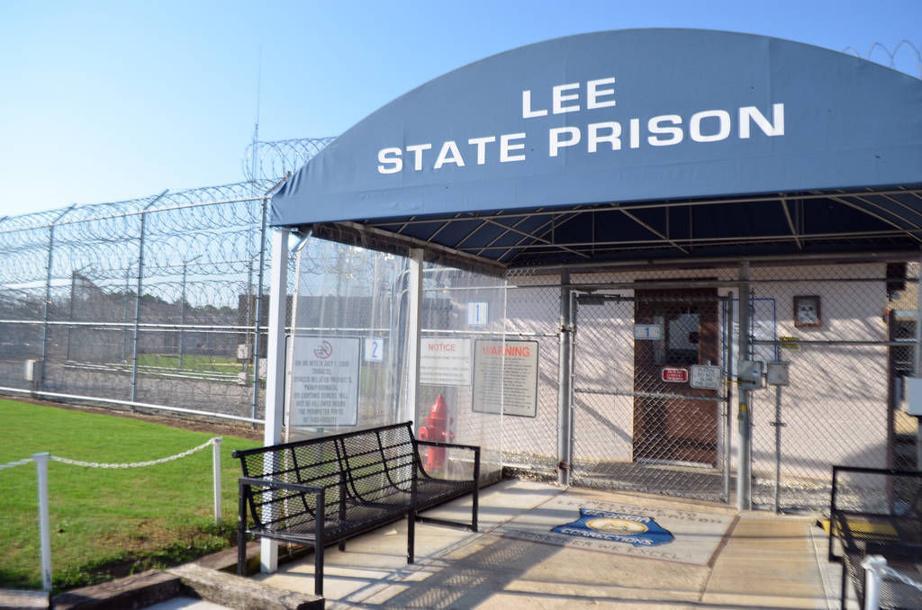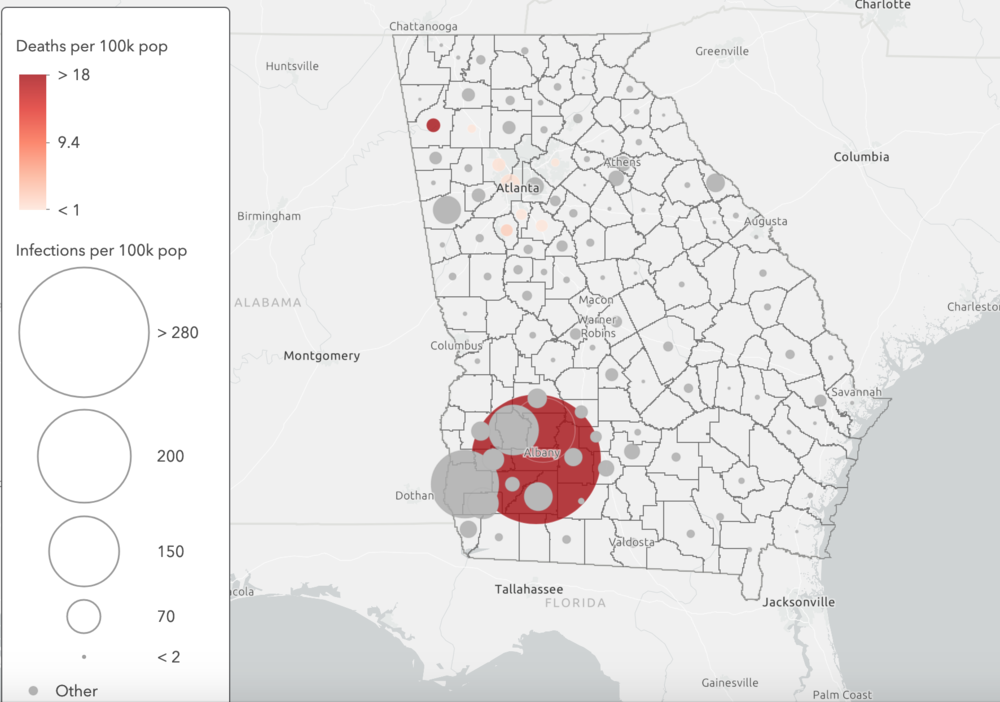Section Branding
Header Content
Coronavirus Updates: 1st Georgia inmate; 1st US Infant Death Reported
Primary Content
The first death of an infant from COVID-19 was reported Saturday, according to the Illinois Department of Public Health. Only 1% of Georgia cases involve people age 17 and younger.
“There has never before been a death associated with COVID-19 in an infant," IDPH Director Dr. Ngozi Ezike said. "A full investigation is underway to determine the cause of death. We must do everything we can to prevent the spread of this deadly virus. If not to protect ourselves, but to protect those around us.”
COVID-19 spreads through Georgia Correctional Facilities
A 49-year-old Lee State Prison inmate who had previously tested positive for COVID-19 died at a hospital in Albany, officials with the Department of Corrections said Friday.
While it is unknown exactly how the virus made its way to the prison, Lee State Prison is near one of Georgia’s coronavirus “hotspots” in Albany, where hospital systems have been overwhelmed with cases and deaths related to COVID-19.
MORE: Albany Mayor Bo Dorough Addresses The Coronavirus Outbreak In Southwest Georgia
Here is the latest coronavirus news from Georgia for Saturday, March 28, 2020.
As of 7 p.m. Saturday, there are 2,446 confirmed cases with 660 hospitalized and 79 deaths in Georgia, according to the Georgia Department of Public Health.
That compares to Friday's 2,198 confirmed cases of COVID-19 in over 100 of Georgia’s 159 counties with 65 reported deaths. Albany now has the fourth-highest rate of infection per capita of all cities in U.S., according to the New York Times.
More than 9,000 people have been tested by commercial labs and more than 2,000 have tested positive. The largest percent of people with COVID-19 in Georgia are between the ages of 18 and 59 (56%).
Worldwide, 139,263 people have recovered and 30,438 people have died of COVID-19. Georgia's state health department is not currently reporting the number of people who have recovered from COVID-19.
Emergency waivers submitted by Gov. Brian Kemp and Department of Community Health to support healthcare workers
The 1135 Medicaid and Medicare waivers requested will allow Georgia healthcare providers to care for patients without the red tape of federal regulations during the current public health emergency, Kemp's office said Saturday.
The governor’s office stressed the waivers will not compromise the level of care patients receive, DCH Commissioner Frank Berry said.
"Some examples of requested flexibilities include modifying the Medicaid authorizations process to enhance fee-for-service prior authorization requirements by extending certain pre-existing authorizations; expediting long-term care services and supports process for pre-admission screening and annual resident review; extending fair hearings and appeal timelines for managed care and fee-for-service enrollees; streamlining provider enrollment, recredentialing, and revalidation processes, including for out-of-state providers; modifying reporting and oversight requirements in certain healthcare facilities; and expanding provider settings to help ensure our providers can deliver care in non-traditional settings," Berry said in a statement.
These waiver requests, in addition to a recent expansion of telehealth options for patients and providers, will help to promote access to care during this unprecedented public health emergency, Berry said.
More Georgia Counties are urging residents to stay home
Gwinnett County and DeKalb County both announced stay-at-home orders for their residents. While Gwinnett’s order went into effect at 12:01 a.m., DeKalb’s will not go into effect until 9 p.m.
Gov. Brian Kemp urged to shut down Georgia ahead of town hall
Kemp and members of his coronavirus task force faced questions from journalists and Georgians in a televised town hall about why there is no statewide stay-at-home order.
The governor said his decisions were made in consultation with his task force, public health leaders and local elected officials from all corners of Georgia. His biggest message is for people to stay at home if they can, practice social distancing and work to minimize the spread of COVID-19.
“There's a lot of great things going on at the local level, if we can get our citizens to follow these directions,” Kemp said. “It will absolutely turn this curve. We can get to the other side of this virus and it’s critical that we do that for our health care system.”
Kemp said he is trying to balance the mounting public health concerns coronavirus has wrought on communities across the state with the economic concerns other communities without many (or any) cases could face with a shutdown order.
“You have people saying, ‘Look, we need to be working, I'm worried about losing my home, I'm worried about getting meals for my kids,’” he said. “And so those are the kind of things that we're balancing… but all of this is to focus on the public health of our citizens.”
At the same time, the governor explained why he ordered public K-12 schools closed through April 24, stating that it would give officials time to figure out where the virus is spreading.
"The data that we're seeing today is two weeks old, the data that we're going to see two weeks from now is what really happened today, and that's just the nature of this,” Kemp said.
Democratic lawmakers, public health officials and frontline healthcare workers have argued that’s precisely the reason for a statewide order.
Also part of the town hall: Georgia Department of Public Health Commissioner Kathleen Toomey. Her answers focused on educating Georgians about COVID-19 and the way it spreads.
“I'm less focused on the exact number [of cases], and more focused on how we can get individuals to think about prevention,” she said.
Toomey added that there are data that suggest social distancing is working in some areas that had initially high numbers, like Rome.
She also said that the state is working with the federal government, the Georgia Emergency Management Agency and private vendors to ensure there is enough protective equipment for health care workers and those who are ill from the virus.
“We are assessing the needs of the hospitals constantly,” she said. “We have our first of shipment of ventilators coming in to help some of the harder hit areas like Rome and Albany. And we're still keeping track of that.”
House Speaker Ralston supports a statewide lockdown
Speaking on GPB’s Political Rewind, House Speaker David Ralston (R-Blue Ridge) said he supports the state staying at home for a while to severely curb the impact of coronavirus.
Cities and counties have deployed patchwork solutions, but Ralston said that fails to account for how mobile people are.
“If we have the virus, we're not going to leave it in the driveway when we leave to go to work each day,” he said. ”A crisis like this does not end at the county line or at the city limits. I mean, it truly encompasses the entire state.”
Ralston also said the likely havoc coronavirus will wreak on the state’s budget means a proposed teacher pay raise and a proposed tax overhaul and cut will likely be shelved.


